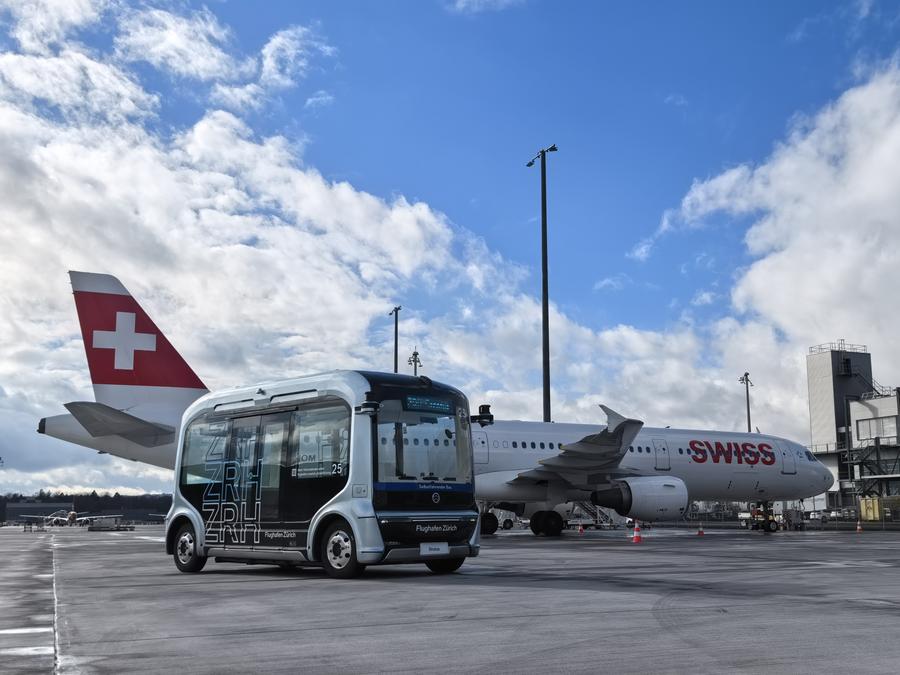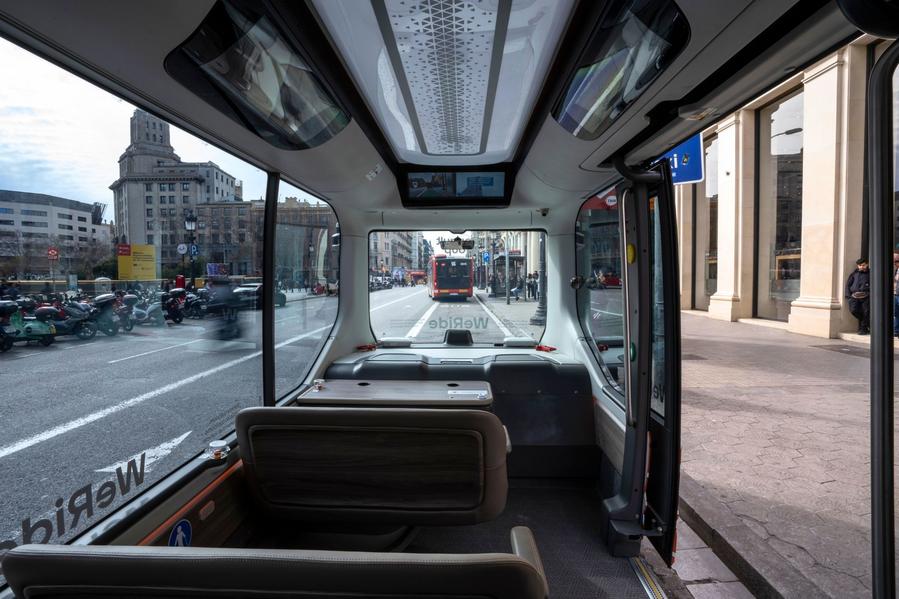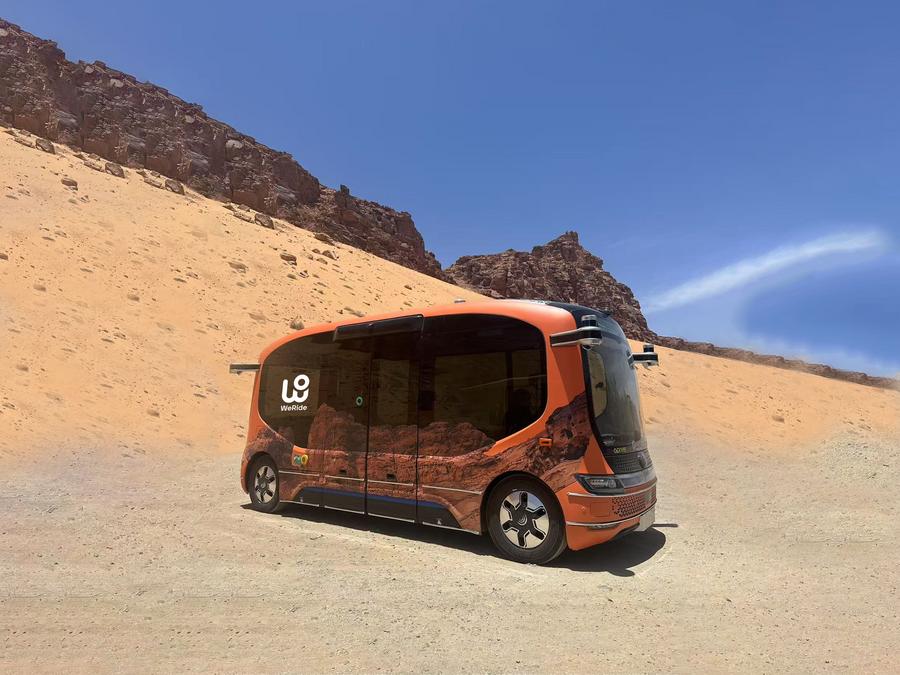

*Chinese autonomous driving firms are accelerating their global expansion, fueled by mature technologies, swift deployment cycles and rising international demand.
*The rise of China's autonomous driving industry is creating ripple effects across global markets, offering development opportunities far beyond transportation.
*Chinese autonomous driving firms will secure a strong foothold in the global mobility market, ultimately becoming a hallmark of "Made-in-China" innovation.
GUANGZHOU, June 26 (Xinhua) -- Driverless sedans glide smoothly to the curb, autonomous shuttles whisk travelers through airport terminals, and robotic sweepers hum along busy streets. These once-futuristic scenes are fast entering everyday life across the globe, and many of them are powered by Chinese technology.
From San Jose of California to Paris and Riyadh, China's swiftly advancing autonomous driving industry is gaining ground, exporting cutting-edge solutions that are quietly transforming how people move and how cities function.
"Chinese autonomous driving firms are accelerating their global expansion, fueled by mature technologies, swift deployment cycles and rising international demand," said Liu Jinshan, a professor at Jinan University in south China's Guangzhou.

This photo taken on April 17, 2025 shows a WeRide Robobus (front) operating at an airport in Zurich, Switzerland. (Xinhua)
GOING GLOBAL
In late May, Chinese autonomous driving firm WeRide made headlines as its self-driving vehicles began rolling through the streets of the capital Riyadh and the historic city of AlUla in Saudi Arabia.
Almost simultaneously, another major player, Guangzhou-based Pony.ai, also shifted its global ambitions into higher gear, announcing a strategic partnership with Dubai's Roads and Transport Authority (RTA) to launch autonomous transport services.
These moves are among the latest examples of a broader trend -- a larger push by Chinese autonomous vehicle (AV) developers to expand their global presence.
Chinese-developed autonomous driving technologies have made inroads into a growing number of global markets -- including the United States, France, Spain, Switzerland, Luxembourg, Singapore, Saudi Arabia and the United Arab Emirates.
Chinese tech giant Baidu serves as a prime example of this momentum. In the first quarter of 2025, its autonomous ride-hailing arm, Apollo Go, completed over 1.4 million rides, up 75 percent year on year, bringing its global total to over 11 million rides by May.
Much of this success can be attributed to China's innovation-friendly environment. By the end of 2024, the country had established 17 national-level intelligent connected vehicle testing zones, with more than 32,000 kilometers of open test roads and over 120 million kilometers of cumulative test mileage, according to official figures.
As Chinese AV firms gain global traction, collaboration with global players is deepening. Uber, for instance, has teamed up with WeRide and Pony.ai to integrate Chinese-developed AVs into its ride-hailing platform, starting with pilot operations in the Middle East.
"It's clear that the future of mobility will be increasingly shared, electric and autonomous," said Uber CEO Dara Khosrowshahi. "We look forward to working with Chinese leading AV companies to help bring the benefits of autonomous technology to cities around the world."

This photo taken on March 11, 2025 shows an interior view of a WeRide Robobus operating in downtown Barcelona, Spain. (Xinhua)
MUTUAL BENEFITS
The rise of China's autonomous driving industry is creating ripple effects across global markets, offering development opportunities far beyond transportation.
Peng Jun, co-founder and CEO of Pony.ai, said the company's overseas expansion has sparked deep collaboration across the broader mobility value chain -- spanning auto manufacturing, R&D, logistics and smart mobility services.
"Deploying autonomous vehicles attracts global component suppliers to invest in local facilities, which helps form industrial clusters and boosts the competitiveness of local manufacturing," Peng noted.
The benefits go beyond factories. According to Zhang Yuxue, WeRide's director of PR and marketing, local partnerships have also led to job creation in areas such as safety operations, fleet management and technical support.
Notably, as Chinese AV companies venture into regions with varied road conditions, climates and regulatory environments, their technologies are evolving in step.
"Expanding globally helps us sharpen our algorithms to adapt to complex, real-world scenarios, ranging from the narrow urban roads of Europe to the extreme heat of the Middle East," said Zhang.
Wu Qiong, an autonomous driving expert at Baidu, said Apollo Go is building a "full-spectrum technical validation chain" as it expands overseas. "For example, we're testing in Switzerland, a right-hand-drive country with some of the world's most stringent traffic laws, which offers one of the toughest proving grounds for autonomous vehicles," Wu said.

This photo taken on May 25, 2025 shows a WeRide Robobus operating in the historic city of AlUla in Saudi Arabia. (Xinhua)
CHALLENGES ON ROAD AHEAD
Despite impressive strides, industry insiders note that autonomous driving remains in the early stages of commercialization and global expansion.
China's autonomous driving industry still faces significant headwinds on its path to global growth, said Wu Zhanchi, a professor at Jinan University. "Challenges range from adapting to overseas regulatory frameworks and overcoming high technical localization barriers, to ensuring compliance with cross-border data regulations and fierce competition from international giants," Wu added.
"The sector also faces significant challenges in technological innovation and the development of sustainable business models," said Zhu Xichan, professor at Tongji University in Shanghai.
Zhu emphasized that achieving scale is crucial for the long-term viability of the AV industry. "Global expansion not only broadens the range of real-world application scenarios but also boosts deployment volumes, both of which are vital for refining technologies and developing commercially viable models," he said.
Yet, several companies have begun to tackle these hurdles head-on. Peng Jun of Pony.ai said the company has overcome key challenges -- such as cost reduction and front-end mass production. "Our products have reached a level of maturity, and we have achieved positive unit economics," he noted.
Looking ahead, Peng said Pony.ai will continue to expand in Asia, the Middle East and Europe, leveraging existing partnerships to accelerate the growth of its global footprint.
Zhang Yuxue echoed this sentiment, saying that WeRide is committed to broadening its international reach by promoting a diverse fleet of autonomous solutions, ranging from robotaxis and minibuses to freight trucks, sanitation vehicles and advanced self-driving systems.
General Manager of Apollo Go for Europe and the Middle East Zhang Liang said Baidu aims to build the largest driverless fleet in Abu Dhabi by partnering with local stakeholders to jointly foster a robust autonomous driving ecosystem.
In addition, Baidu is exploring cooperation with local new energy firms to develop innovative services, including battery swapping, which Zhang said will help improve operational efficiency.
"Given their growing track record in both domestic and international markets, there is good reason to believe that Chinese AV firms will secure a strong foothold in this global mobility market, ultimately becoming a hallmark of 'Made-in-China' innovation," Wu noted.
点击右上角![]() 微信好友
微信好友
 朋友圈
朋友圈

请使用浏览器分享功能进行分享
